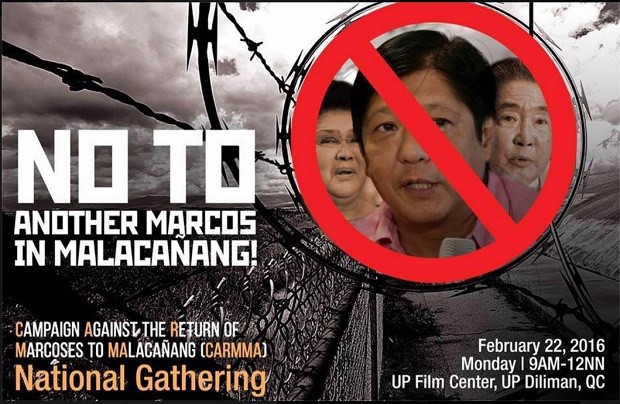
A screengrab of the cover photo of the Facebook page of CARMMA shows the group’s opposition to Ferdinand ‘Bongbong’ Marcos being voted back into Malacañang. FACEBOOK SCREENGRAB
In order to form the broadest people’s movement against the vice presidential bid of Sen. Ferdinand “Bongbong” Marcos Jr., volunteers of the Campaign Against the Return of the Marcoses to Malacañang (Carmma) on Saturday appealed to netizens to change their profile photos on social media like Facebook to an image of the Carmma icon.
The icon is a caricature of the senator’s father, the late dictator Ferdinand Marcos, back-to-back with the son’s, encircled and marked with a red X, and accompanied by the text: “No to another Marcos in Malacañang!”
The image was unveiled to members of the media in a forum on World Day Against Cyber Censorship held in Manila on Saturday, which was attended by speakers and Carmma volunteers Bayan (Bagong Alyansang Makabayan) Metro Manila chair Mong Palatino, College Editors Guild of the Philippines (CEGP) national president Marc Lino Abila and journalism professor Danilo Arao of the University of the Philippines Diliman.
The image is available on Carmma’s Facebook page.
Palatino, Arao and Abila called on voters, especially the youth, to actively push the campaign against Marcos, calling to mind the horrors committed by his family during martial law.
Arao said Carmma needed to find ways to reach more people, especially with all the false information being spread by Marcos’ camp.
“Those who claim that the Marcos presidency was the country’s ‘golden age’ are either unaware of the censorship or oblivious to the repression. As a vice presidential candidate, Bongbong Marcos remains defensive of his father’s so-called legacy. Concerned Filipinos should be on the offensive in terms of continuously exposing the evils of martial law,” he said.
READ: ‘Carmma’ to hound Bongbong campaign
Arao also appealed to members of the media, particularly those in broadcasting, to be more critical of political advertisements which they allow to be aired.
“Don’t just go after revenues. It’s an editorial decision to reject advertisements that extol false virtues, like Bongbong’s [ads] do,” he said.